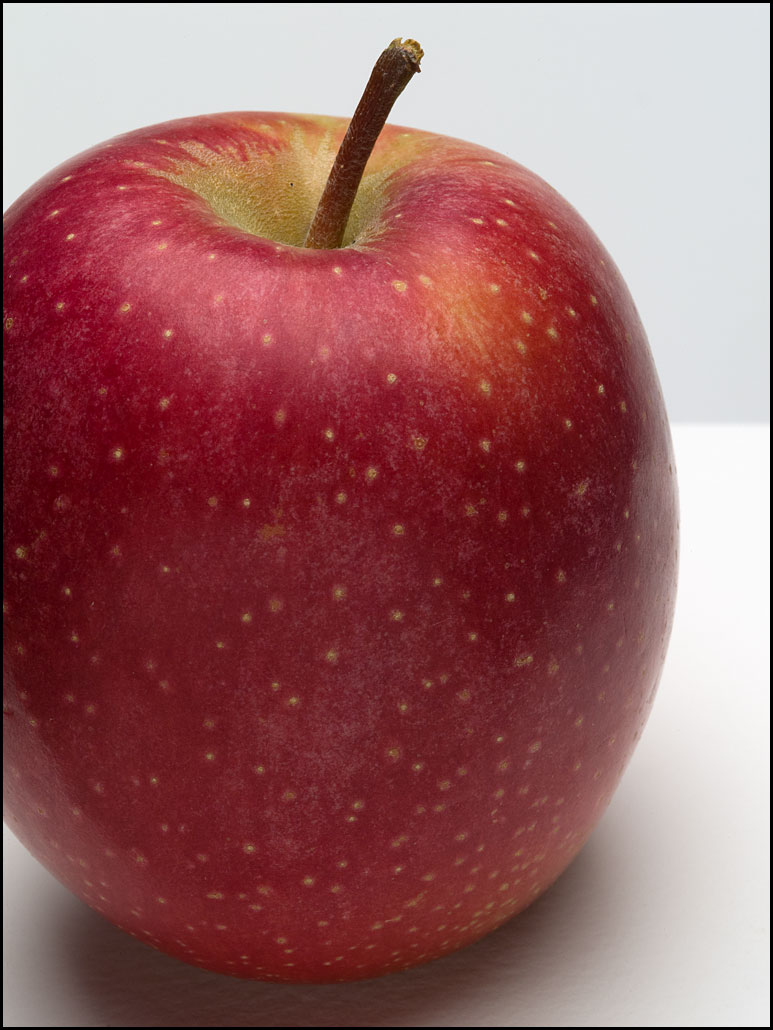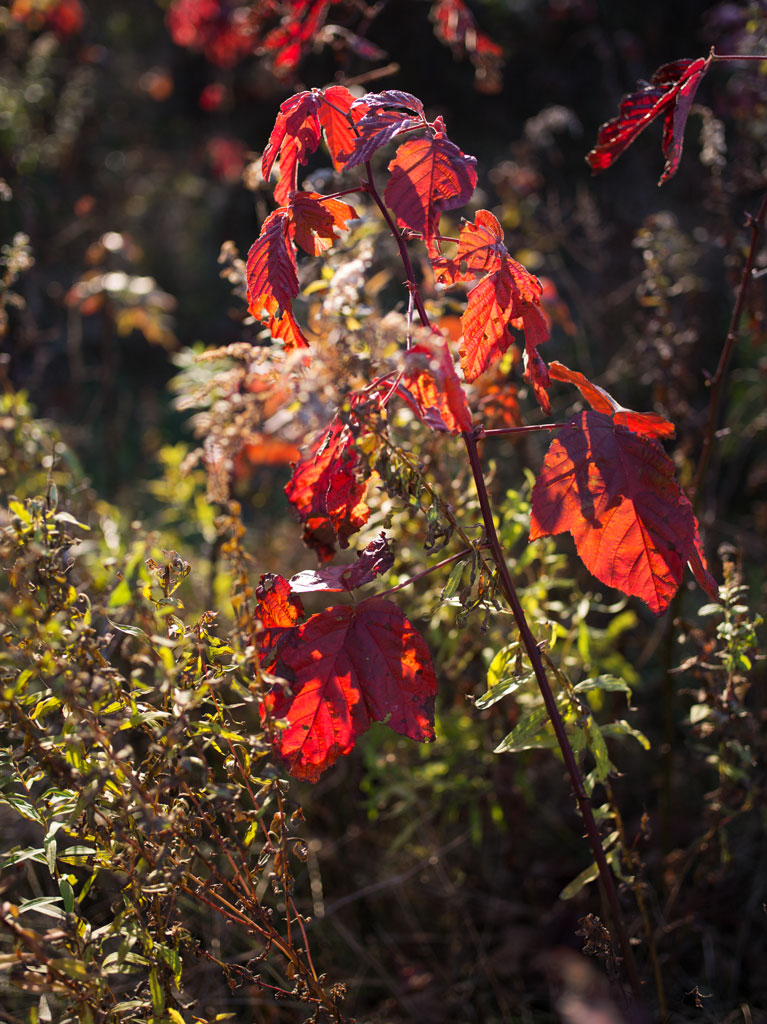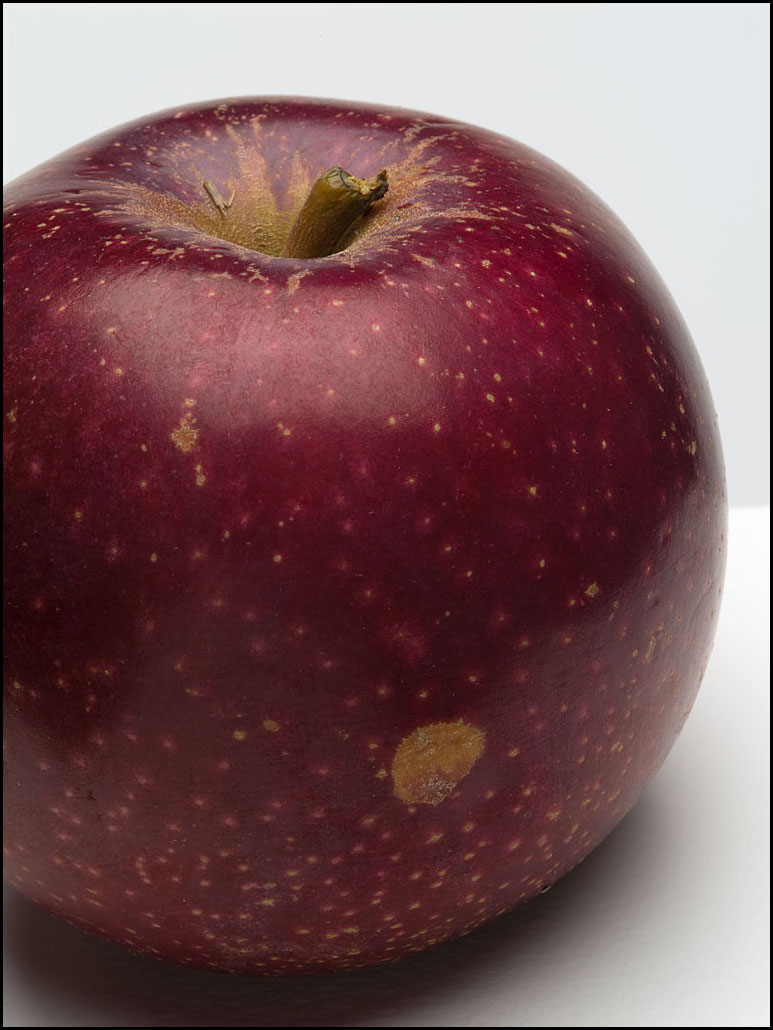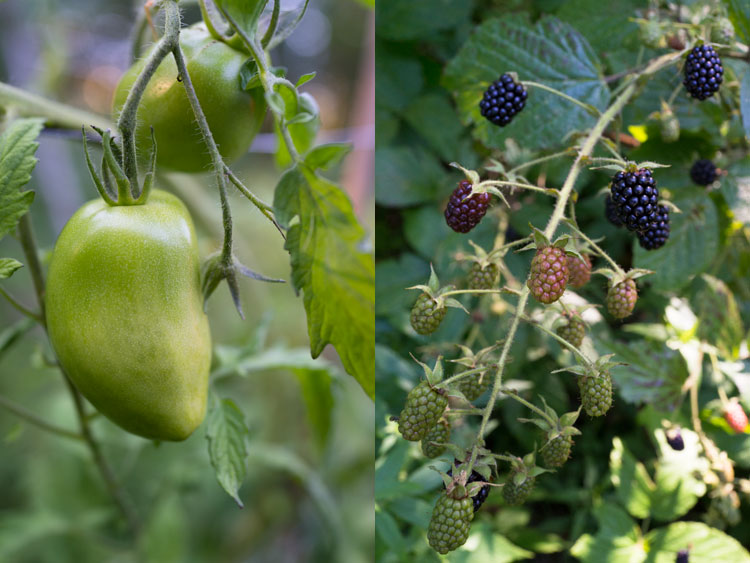 The Spencer is a great eating apple—crisp and tangy. The fruit is a cross between McIntosh and Golden Delicious, but I prefer the Spencer over either of its parents.
The Spencer is a great eating apple—crisp and tangy. The fruit is a cross between McIntosh and Golden Delicious, but I prefer the Spencer over either of its parents.
Category Archives: Edible Garden
The Tranquility of Late Fall, Part 2
 One of the bounties we received by letting our field revert to nature was an explosion of blackberry. Blackberries are one of our most productive crops that supplies us with fruit though winter and into the spring. But now in late fall, over two months since the last berry was picked, the blackberry canes are putting on a wonderful display of color.
One of the bounties we received by letting our field revert to nature was an explosion of blackberry. Blackberries are one of our most productive crops that supplies us with fruit though winter and into the spring. But now in late fall, over two months since the last berry was picked, the blackberry canes are putting on a wonderful display of color.
Blue Pearmain—Apples of Maine
 Blue Pearmain is a fine dessert apple. While it shares the same name as the Gray Pearmain, its character and appearance could not be more different. A subtle apple with a soft texture and mild flavor. This heirloom variety has been grown throughout Maine and New England for more than 200 years.
Blue Pearmain is a fine dessert apple. While it shares the same name as the Gray Pearmain, its character and appearance could not be more different. A subtle apple with a soft texture and mild flavor. This heirloom variety has been grown throughout Maine and New England for more than 200 years.
Gray Pearmain—Apples of Maine
 Gray Pearmain is a russet apple, which is marked by a rich, earthy taste. The character is not quite as distinctive as the Golden Russet—the Pearmain has a cleaner flavor. Like many fall varieties, it stores well. A great apple.
Gray Pearmain is a russet apple, which is marked by a rich, earthy taste. The character is not quite as distinctive as the Golden Russet—the Pearmain has a cleaner flavor. Like many fall varieties, it stores well. A great apple.
Mutsu—Apples of Maine
 Mutsu is a beautiful yellow apple that can develop a red blush. The variety is thought to have originated in Japan. If you have had Asian or Japanese pears, then this apple is going remind you of those. It is large with a finely textured skin and a satisfying crispness when you bite into one. The flavor is complex—it takes some time to realize its character. Sweet, yes, but also tangy.
Mutsu is a beautiful yellow apple that can develop a red blush. The variety is thought to have originated in Japan. If you have had Asian or Japanese pears, then this apple is going remind you of those. It is large with a finely textured skin and a satisfying crispness when you bite into one. The flavor is complex—it takes some time to realize its character. Sweet, yes, but also tangy.
Winter Banana—Apples of Maine
 Winter Banana is one of our favorite apples. It is a large fruit with a smooth waxy skin. Its distinctive yellow with a bright red blush makes it quite startling at first sight. Winter Banana is a crisp apple that has a slight tart character with a banana undertone. We have used these in pies. The flavor is fine, but it does fall apart and becomes more like apple sauce than apple slices.
Winter Banana is one of our favorite apples. It is a large fruit with a smooth waxy skin. Its distinctive yellow with a bright red blush makes it quite startling at first sight. Winter Banana is a crisp apple that has a slight tart character with a banana undertone. We have used these in pies. The flavor is fine, but it does fall apart and becomes more like apple sauce than apple slices.
Golden Russet—Apples of Maine
 The wonderful thing of living in a place with so many orchards is the variety of apples. We especially love the heirloom varieties. To me, the Golden Russet is one of the great apples. Russets are recognizable by the texture of the skin. Biting into one gives an instant reward—it is a crisp apple that has a strong earthy flavor. If you have never tasted a russet, it is hard to describe its complex character. This apple stores well and is excellent for sweet and hard ciders.
The wonderful thing of living in a place with so many orchards is the variety of apples. We especially love the heirloom varieties. To me, the Golden Russet is one of the great apples. Russets are recognizable by the texture of the skin. Biting into one gives an instant reward—it is a crisp apple that has a strong earthy flavor. If you have never tasted a russet, it is hard to describe its complex character. This apple stores well and is excellent for sweet and hard ciders.
Maine Summer Harvest
 This time of year, when our harvest comes in, is a real blessing. Even with the cold, wet summer that has kept our tomatoes from being a nice ripe red, we still feel very grateful for the bounty.
This time of year, when our harvest comes in, is a real blessing. Even with the cold, wet summer that has kept our tomatoes from being a nice ripe red, we still feel very grateful for the bounty.
Our largest and most anticipated crop is our blackberries and black raspberries. For three to four weeks, we will collect three to four pounds of berries every other evening. The scars and wounds the thorns leave on my arms are a small price to pay for this fruit. Not only will this provide fresh food for our breakfast and dinner table for the month, we will freeze a good portion which will last well into the new year.
The amazing thing about blackberries, beyond the terrific yields, is the carefree nature of the plant. They do as well in the shade of our forest as under the bright sun in our field. They are not fussy about soil type. They can dry out under the sun, but once they establish a good ground cover, they can protect themselves. Our field briers provide habitat for beautiful orb-weaver spiders as well as bedding and shelter for the local deer.
But the blackberries signal for the end of this season in Maine. These plants project the wisdom of age, contrasting their explosive and impetuous growth of spring. They lead us gracefully out of the last stage of summer—their yellowing foliage on the canes anticipate that of our trees and the approaching winter.
